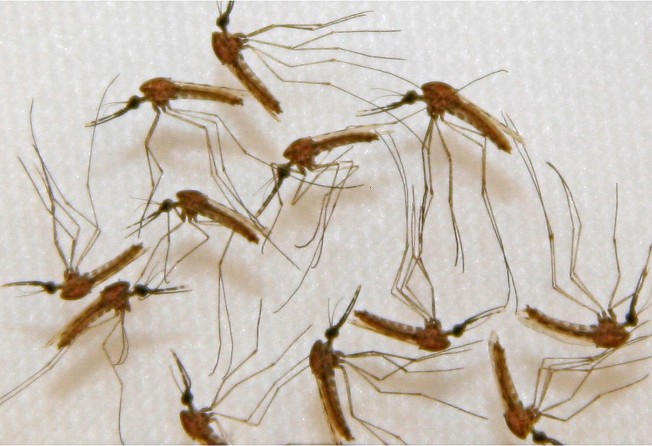
British scientists modify mosquitoes to breed mostly males, in fight against malaria
Gene switch that ensures most of insect's eggs produce males, causing plunge in populations, is hailed as 'quantum leap' in disease fight

Scientists have hailed the genetic modification of mosquitoes that could crash the insect's populations as a "quantum leap" that will make a substantial and important contribution to eradicating malaria.

The technique by a team at Imperial College London involves injecting mosquitoes with a gene that causes the vast majority of their offspring to be male, leading to a dramatic decline in population within six generations as females disappear.
"You have a short-term benefit because males don't bite humans [or transmit malaria]," said Professor Andrea Crisanti, one of the authors of the new research, which was published in the journal Nature Communications on Tuesday.
"But in the long term you will eventually eradicate or substantially reduce mosquitoes. This could make a substantial contribution to eradicating malaria, combined with other tools such as insecticides."
The scientists injected mosquitoes with a gene from slime mould - a homing endonuclease or enzyme called I-PpoI - which attached itself to their X chromosome during the male's sperm-making process and effectively shredded part of the chromosome's DNA. The result was that more than 95 per cent of the mosquitoes' offspring were males. The researchers found that the modified mosquitoes mated with wild mosquitoes, creating fertile mosquitoes which then overwhelmingly produced male offspring, passing on the gene.
"Under field conditions the accumulation of X chromosome damage would significantly contribute to the demise of target populations," the scientists say in their paper.
"The engineering is a quantum leap in terms of what has been done before," said Crisanti, who worked on previous research in 2008, which took a similar approach but unintentionally resulted in sterile mosquitoes, meaning the gene's ability to spread was limited.
Imperial College London also published work in 2011 on a distinctly different approach to impair the fertility of mosquitoes generally, rather than distorting the make-up of their sex.
Dr Luke Alphey, group leader of the vector-borne viral diseases programme at the Pirbright Institute, who was not involved in the latest research, called it a "big step forward" and said field trials could be conducted after further testing. "The overall goal of this research programme is even more ambitious - to develop a version of this genetic system that will spread itself through the target species, removing females and causing population crash or extinction as it goes," he said.
Dr Michael Bonsall, reader in zoology at the University of Oxford, described the research as "super cool work"and said: "This has important implications for limiting the spread of malaria."
Dr Thomas Walker, lecturer at the London School of Hygiene and Tropical Medicine, said that the work was "very good science" and "very promising", but said any uncertainty was in how the GM mosquitoes would fare out of the laboratory and in the field.
Dr Helen Williams, director of GeneWatch UK, a not-for-profit group that has been critical of previous GM mosquito research, warned of the unintended consequences of crashing mosquitoes' populations. "We would want to ensure that the risks are properly considered before GM mosquitoes are released into the environment. For example, reducing the population of one mosquito species can increase the population of other mosquitoes, so you can potentially make it worse. If you change an ecosystem and remove a species, another species often moves into that niche."